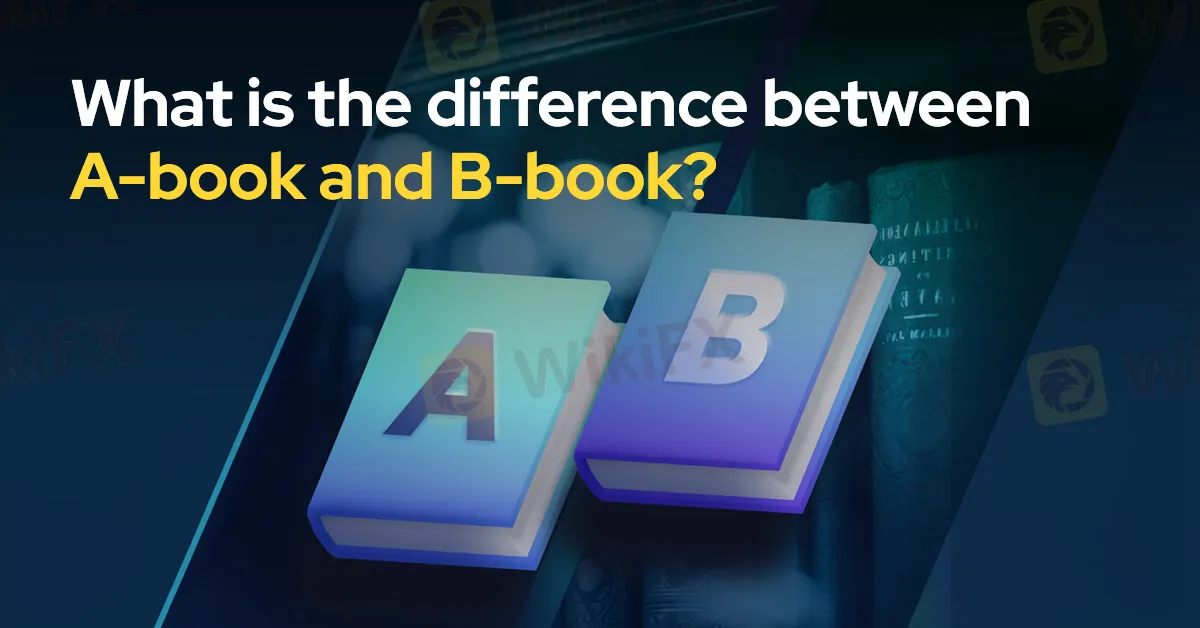简体中文
繁體中文
English
Pусский
日本語
ภาษาไทย
Tiếng Việt
Bahasa Indonesia
Español
हिन्दी
Filippiiniläinen
Français
Deutsch
Português
Türkçe
한국어
العربية
What is the difference between A-book and B-book?
Abstract:Brokers are often classified into two categories: A-book and B-book brokers. Understanding these distinctions can help traders choose the right broker for their trading needs. In this article, we’ll delve into what A-book and B-book brokers are, how they operate, and the key differences between them.

Brokers are often classified into two categories: A-book and B-book brokers. Understanding these distinctions can help traders choose the right broker for their trading needs. In this article, well delve into what A-book and B-book brokers are, how they operate, and the key differences between them.
What Are A-book and B-book Brokers?
To grasp the concept of A-book and B-book brokers, we need to understand the fundamental distinction between them. These terms refer to how brokers handle their clients' trades and manage risk. Importantly, there are no brokers exclusively classified as A-book or B-book; instead, brokers might use one or both models depending on the situation.
A-book Forex Brokers
A-book brokers, often referred to as STP (Straight Through Processing) brokers, are known for passing their clients orders to the interbank market or other external execution venues. They act as intermediaries, sourcing liquidity and facilitating trades between their clients and the broader financial markets.
Characteristics of A-book Brokers:
Direct Market Access: Clients' orders are routed directly to the interbank market, where they are executed at prevailing market prices.
Transparency: Pricing and execution are generally more transparent since orders are fulfilled in the open market.
No Conflict of Interest: Since A-book brokers pass orders to external venues, they do not take opposing positions to their clients trades.
B-book Forex Brokers
B-book brokers, also known as market makers, operate differently. They internalize their clients‘ trades, meaning that orders are fulfilled by the broker’s own dealing desk rather than being passed on to external markets.
Characteristics of B-book Brokers:
Internal Order Fulfillment: Trades are executed internally, often by taking the opposite side of clients trades.
Market Making: The broker sets the bid and ask prices and may benefit when clients lose money, as their losses can directly contribute to the brokers profits.
Client Segmentation: Typically, B-book brokers may place less profitable traders into the B-book system, while more profitable traders might be handled through the A-book system.
Key Differences
The primary difference between A-book and B-book forex brokers lies in their order fulfillment processes:
A-book Brokers: Orders are executed in the interbank market or other external venues. Clients benefit from direct market access with potentially better transparency and pricing.
B-book Brokers: Orders are fulfilled internally by the brokers dealing desk. This can create a conflict of interest, as the broker may profit from clients' losses.
Conclusion
Choosing between an A-book and a B-book broker depends on your trading preferences and goals. A-book brokers offer transparency and direct access to the interbank market, while B-book brokers may provide more favorable conditions for certain types of traders but could have inherent conflicts of interest. Understanding these models can help you make an informed decision and select a broker that aligns with your trading strategy.

Disclaimer:
The views in this article only represent the author's personal views, and do not constitute investment advice on this platform. This platform does not guarantee the accuracy, completeness and timeliness of the information in the article, and will not be liable for any loss caused by the use of or reliance on the information in the article.
Read more

Good News Malaysia: Ready for 5% GDP Growth in 2025!
Malaysia's economy is on track to sustain its robust growth, with GDP expected to exceed 5% in 2025, according to key government officials. The nation's economic resilience is being driven by strong foreign investments and targeted government initiatives designed to mitigate global economic risks.

Tradu Introduces Tax-Efficient Spread Betting for UK Traders
Tradu’s introduction of tax-efficient spread betting and groundbreaking tools like the Spread Tracker signals a new era of accessible, competitive, and innovative trading solutions for UK investors.

Trading Lessons Inspired by Squid Game
The popular series Squid Game captivated audiences worldwide with its gripping narrative of survival, desperation, and human nature. Beneath the drama lies a wealth of lessons that traders can apply to financial markets. By examining the motivations, behaviours, and strategies displayed in the series, traders can uncover valuable insights to enhance their own approach.

How Far Will the Bond Market Decline?
Recently, the yield on the U.S. 10-year Treasury bond reached a new high since April 2023, soaring to 4.7%.
WikiFX Broker
Latest News
High-Potential Investments: Top 10 Stocks to Watch in 2025
US Dollar Insights: Key FX Trends You Need to Know
Why Is Nvidia Making Headlines Everywhere Today?
Discover How Your Trading Personality Shapes Success
FINRA Charges UBS $1.1 Million for a Decade of False Trade Confirmations
Bitcoin in 2025: The Opportunities and Challenges Ahead
BI Apprehends Japanese Scam Leader in Manila
Big News! UK 30-Year Bond Yields Soar to 25-Year High!
SQUARED FINANCIAL: Your Friend or Foe?
Join the Event & Level Up Your Forex Journey
Currency Calculator






